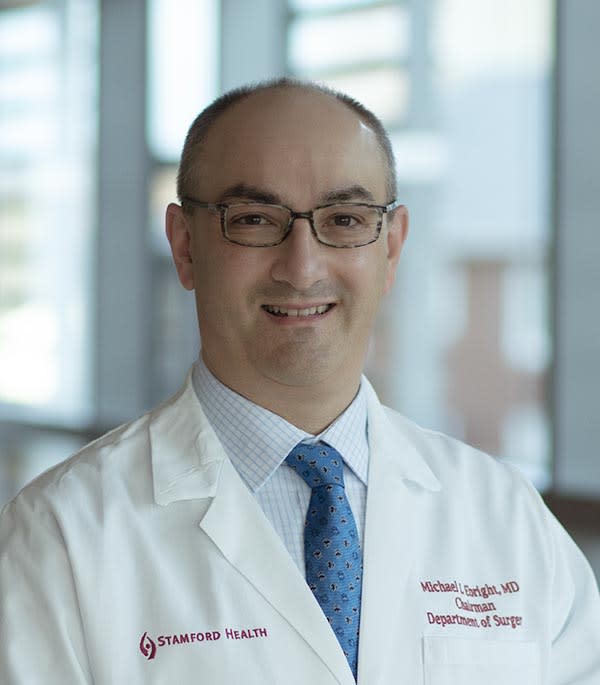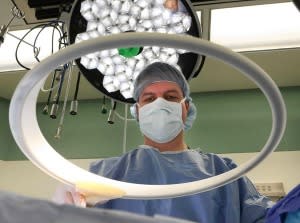Michael Ebright, MD, Director of Thoracic Surgery, Director of the Heartburn, Reflux & Esophageal Specialty Center, Stamford Health
Having Symptoms?
Get expert treatment for heartburn, reflux & esophageal diseases. Call 203.276.4373 or
Do you experience a burning feeling in your chest after you eat, lie down, or bend over? If so, you’re not alone. Heartburn and other esophagus problems are common—and easily treated. Learn about causes, symptoms, and treatments for esophagus problems, such as heartburn, acid reflux, and Barrett’s esophagus, to help you find relief.
When to See a Specialist
Rely on Stamford Health’s Heartburn, Reflux & Esophageal Specialty Center if you experience:
- A sour taste in your mouth
- Chest discomfort
- Difficulty swallowing
- Fatigue or other symptoms of iron-deficiency anemia
- Feeling of food being stuck
- Hoarseness
- Persistent heartburn
- Pneumonia (lung infection)
- Shortness of breath or wheezing
Causes of Esophagus Problems
The number of cases of GERD, Barrett’s esophagus, and esophageal cancer are on the rise because of poor diet choices and the obesity epidemic. Not everyone with an esophagus problem is overweight.
Hiatal hernia, the bulging of the stomach up through the diaphragm and into the chest can cause GERD. These hernias can be mild or severe.
Symptoms of a Hiatal Hernia
If you have a hiatal hernia, you may experience:
- Abdominal discomfort
- Feeling like food gets stuck in your esophagus
- Feeling full early into your meal
- Heartburn
- Iron deficiency anemia
Diagnosing Hiatal Hernia
If you experience symptoms of a hiatal hernia, your doctor may recommend a contrast esophagogram—an X-ray of the esophagus. You’ll drink a milkshake that contains contrast and allows the radiologist to capture accurate images to look for any signs of a hiatal hernia.
What's GERD?
Gastroesophageal reflux disease, known as GERD, is a long-lasting (chronic) digestive disorder that happens when the one-way valve between the esophagus and the stomach doesn’t work well. When you have a poorly functioning valve, stomach acid flows backward into the esophagus and irritates the lining.
Complications of GERD
GERD can cause damage to the lining of the esophagus because of the frequent exposure to stomach acid. This condition, known as Barrett’s esophagus, causes frequent heartburn and difficulty swallowing.
Only a small amount of people with GERD develop Barrett’s esophagus.
Am I at Risk for Esophageal Cancer?
Barrett's esophagus increases your risk of esophageal cancer. As with many cancers, early detection is key. Trust the esophagus team at the Heartburn, Reflux & Esophageal Specialty Center to track your health and follow the most current screening guidelines.
To reduce your risk of developing esophageal cancer, quit smoking and limit alcohol.
Most people with Barrett’s esophagus will not develop esophageal cancer.
Treatment Options for Esophageal Diseases
Access a wide range of safe and effective treatment options for esophageal diseases at the Heartburn, Reflux & Esophageal Specialty Center. You’ll find a multidisciplinary team of physicians, nurses, coordinators, and nutritionists who provide the highest level of compassionate, patient-centered care.
Esophagus Surgery
If your symptoms have not improved with conservative treatments, your doctor may suggest surgery, such as:
- Laparoscopic magnetic sphincter augmentation – Places a gentle magnetic bead ring around the bottom of the esophagus to protect it from stomach acid
- Transoral incisionless fundoplication – relieves symptoms of GERD by wrapping a portion of the stomach around the esophagus
Find Relief with Surgery
I like hearing my patients’ positive feedback after surgery. Depending on your symptoms, surgery may help you:
- Sleep more comfortably on your back at night because you no longer have debilitating reflux
- Feel comfortable eating at restaurants since you won’t have to worry about your symptoms
- Live without medications to treat esophagus conditions
It’s my mission to help patients struggling with gastroesophageal reflux and other esophageal diseases achieve all of the above.
Featured Expert/ Author








)





